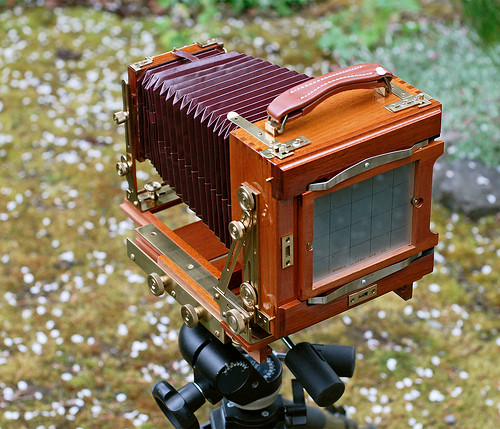Difference between revisions of "Wisner"
(Minor changes to text) |
(Replaced most of the summary at the start. Ron Wisner himself says (1) he started the company (so not 2nd generation) and (2) he just closed the co, it didn't go bust.) |
||
| Line 9: | Line 9: | ||
}} | }} | ||
</div> | </div> | ||
| − | '''Wisner''' ('''Wisner Classic Manufacturing Co.''') was a camera maker in Marion, Massachusetts, USA. | + | '''Wisner''' ('''Wisner Classic Manufacturing Co.''') was a camera maker in Marion, Massachusetts, USA. The company was started by Ron Wisner in the mid-1980s, while in his twenties, and originally built pipe organs, before turning to make high-end large format cameras. |
| − | The company was | + | |
| + | Wisner closed his company in about 2007. Posts by users at large-format photography fora in the company's later years suggest dissatisfaction with customer service and long lead times for supply,<ref>For example, [https://www.photo.net/forums/topic/144792-ron-wisner-is-unreliable-and-unethical/ this post] at photo.net.</ref> but the company was closed in good order, without debts.<ref>Personal communication from Ron Wisner.</ref> | ||
| − | |||
==Wisner Technical Field== | ==Wisner Technical Field== | ||
| Line 24: | Line 24: | ||
==Lens boards== | ==Lens boards== | ||
The 4X5 Wisner cameras take standard 4"X4" wooden (or metal) lens boards. The 5X7 takes an unusual 5.2" lens board. Most 8X10 cameras take standard Sinar/Horsman (138mm) boards, though earlier cameras take slightly larger standard 6"X6" boards. | The 4X5 Wisner cameras take standard 4"X4" wooden (or metal) lens boards. The 5X7 takes an unusual 5.2" lens board. Most 8X10 cameras take standard Sinar/Horsman (138mm) boards, though earlier cameras take slightly larger standard 6"X6" boards. | ||
| + | |||
| + | |||
| + | ==Notes== | ||
| + | <references/> | ||
<!-- | <!-- | ||
Revision as of 18:18, 26 August 2023

|
| Wisner Technical Field Camera 4x5 image by Richard Droker (Image rights) |
Wisner (Wisner Classic Manufacturing Co.) was a camera maker in Marion, Massachusetts, USA. The company was started by Ron Wisner in the mid-1980s, while in his twenties, and originally built pipe organs, before turning to make high-end large format cameras.
Wisner closed his company in about 2007. Posts by users at large-format photography fora in the company's later years suggest dissatisfaction with customer service and long lead times for supply,[1] but the company was closed in good order, without debts.[2]
Wisner Technical Field
The 'Technical Field' cameras made by Wisner have a unique feature not found on any other folding field camera, which incorporated a geared tilt movement for the rear standard, with a non linear gear rack. This allows the camera to maintain focus position even when tilting the rear standard.
Wisner cameras have very long bellows draw, allowing for long focal lengths to be used, or macro work with a standard lens, thus eliminating some of the drawbacks field cameras have when compared to monorail or studio large format cameras. The 8x10 Wisner features 4 extension beds with a bellows draw of more than 800mm. Wide-angle bellows were also available. Wisner camera bellows were made from kid leather (thin, supple calf leather), usually dyed a light red or purple, and lined with black silk inside.
Materials
Wisner cameras are made of walnut wood and brass hardware, finished in shellac. Because of the shellac, which has a low resistance to wear compared to other metal finishes, the brass hardware on Wisner cameras often shows brassing and wear, even if the camera was lightly used.
Lens boards
The 4X5 Wisner cameras take standard 4"X4" wooden (or metal) lens boards. The 5X7 takes an unusual 5.2" lens board. Most 8X10 cameras take standard Sinar/Horsman (138mm) boards, though earlier cameras take slightly larger standard 6"X6" boards.